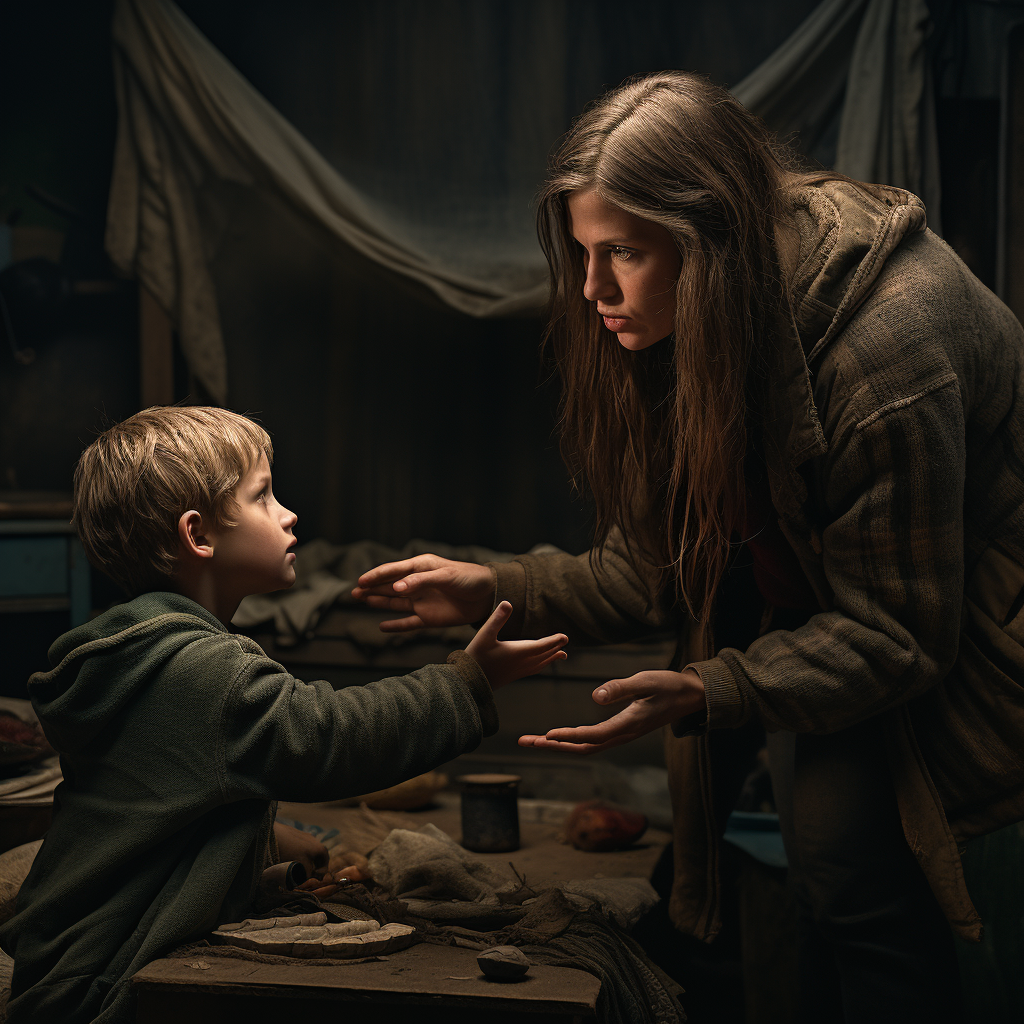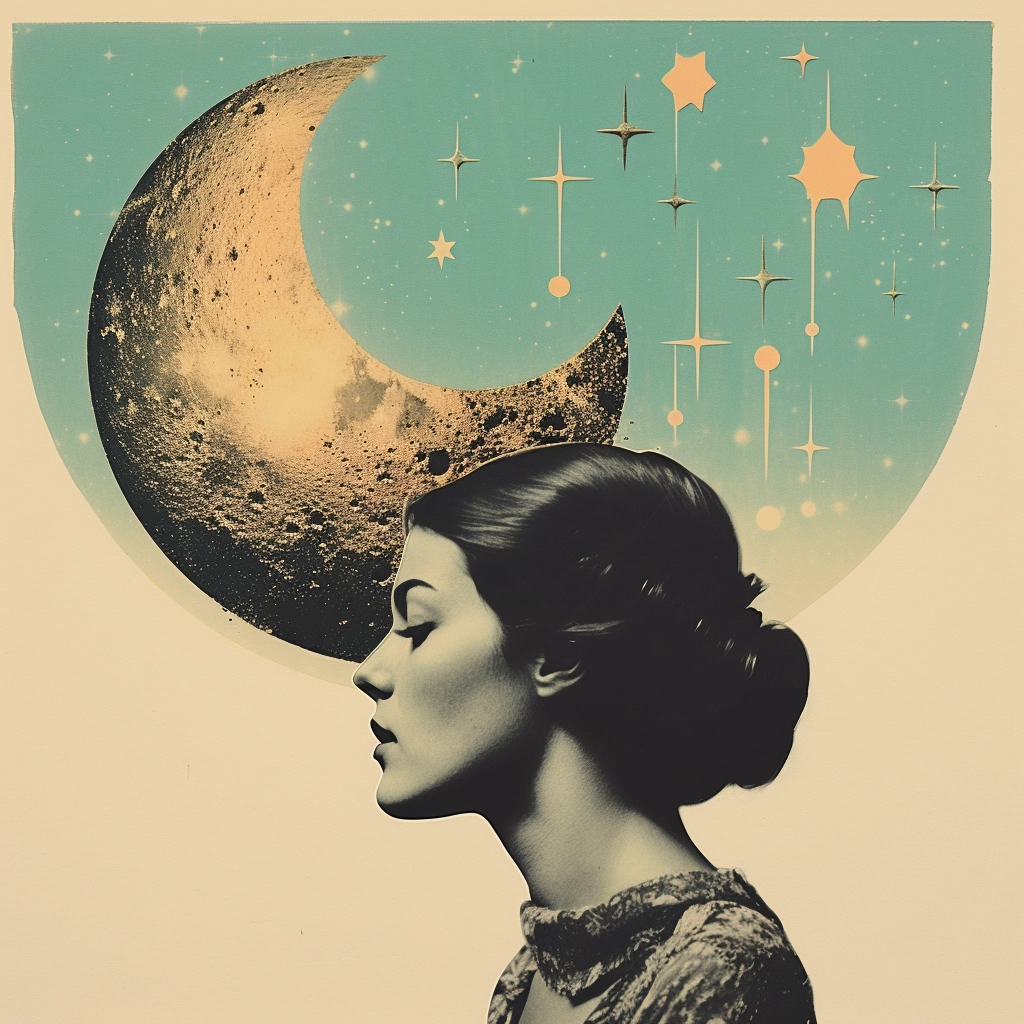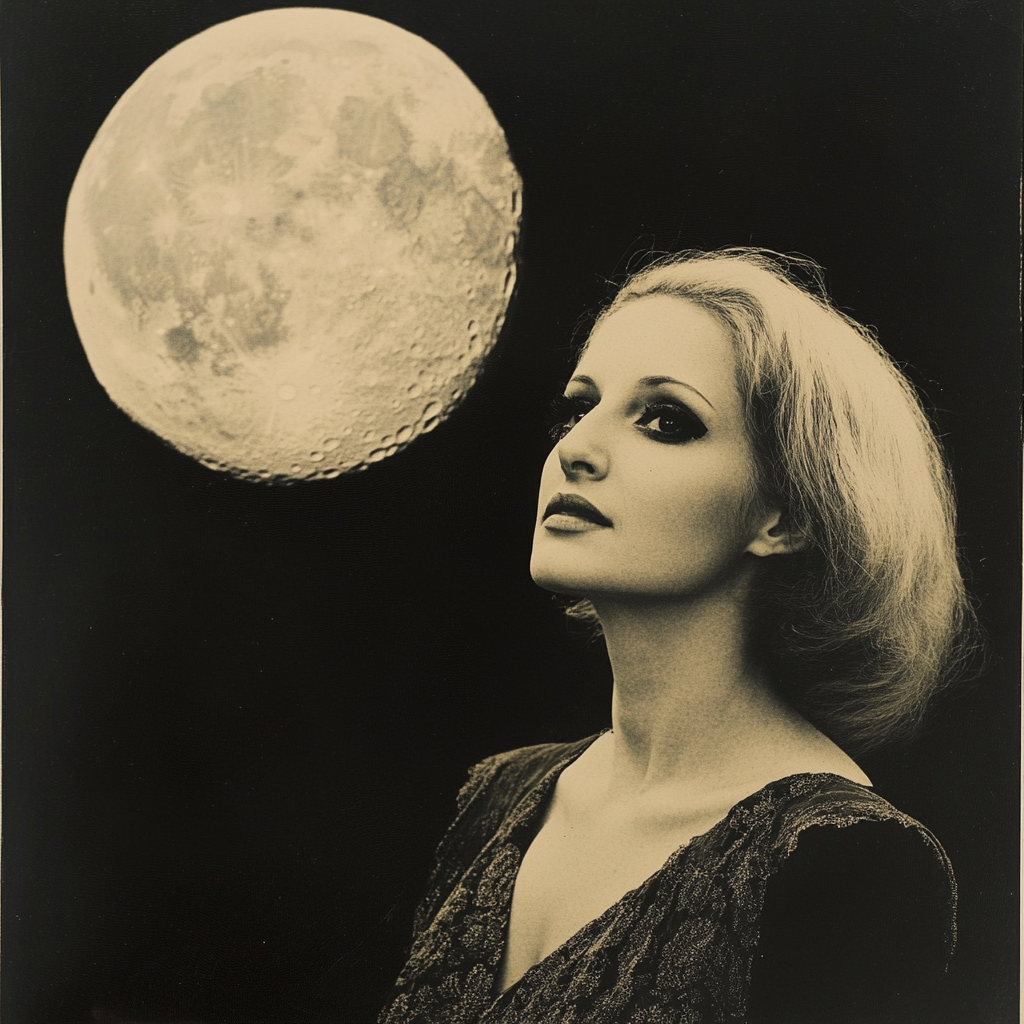
Moon Astrology: Parental Significator/Moon-Saturn
 When the Moon and Saturn form an aspect on the birth chart, the mother under this influence might embody Saturn’s sense of responsibility—perhaps she was always the rock of the family. Picture her as a figure who carried the weight of the world, not just out of obligation, but from a love that demanded action. Perhaps she worked tirelessly, her hands worn and her spirit steady, trying to provide stability. She may not have been the type to gush over every scraped knee, but her love was often found in the roof overhead, the solid advice through the years. With Saturn’s influence, her love might have had a quiet firmness, like the dependable clock ticking away in the background: ever-present, reliable, and grounding.
When the Moon and Saturn form an aspect on the birth chart, the mother under this influence might embody Saturn’s sense of responsibility—perhaps she was always the rock of the family. Picture her as a figure who carried the weight of the world, not just out of obligation, but from a love that demanded action. Perhaps she worked tirelessly, her hands worn and her spirit steady, trying to provide stability. She may not have been the type to gush over every scraped knee, but her love was often found in the roof overhead, the solid advice through the years. With Saturn’s influence, her love might have had a quiet firmness, like the dependable clock ticking away in the background: ever-present, reliable, and grounding.
She might have encouraged the child to rise after every fall, not with sugar-coated reassurances, but with a knowing look that said, “You’ve got this. You’re stronger than you think.”
Of course, as with any Saturnian story, there may have been moments of struggle, where the Moon’s longing for emotional expression clashed with Saturn’s insistence on restraint. A child of this influence might feel as though they had to “earn” love through achievement or duty, rather than simply being who they are. Perhaps with Saturn overshadowing the Moon—the relationship with one’s mother could lean towards feeling overly controlled or judged.
The archetypal push-and-pull of Moon and Saturn can show a more somber portrait when interpreted through the lens of childhood and the maternal relationship. When the strictness of Saturn looms large in this aspect, it’s not uncommon to see a mother who was perceived as demanding, critical, or perhaps emotionally distant. But let’s take a moment to look deeper—not to judge, but to understand, with compassion, the forces at play.
Saturn doesn’t lend itself to softness. It’s the voice of authority, the enforcer of rules, the planet of “getting things done,” no matter the cost. A mother under this influence may have carried the heavy weight of Saturn’s demands, confronting material hardships, illnesses, or relentless work responsibilities. Her tough side may not have stemmed from a lack of love but from a need to survive. This can lead to an upbringing where the child feels an immense pressure to live up to high standards, to be worthy of affection through obedience or achievement. The Moon, longing for unspoken understanding, can feel limited in such an environment. The emotional expression gets tucked away in a box marked “later,” while Saturn’s voice says, “We don’t have time for that now—there are bigger priorities.” For the child, this can create a sense of emotional deprivation, a longing for validation or warmth that feels just out of reach. But—and this is a Saturnian lesson in itself—it’s important to recognize the circumstances of the mother’s life, the external pressures that may have shaped her parenting. Material struggles, societal expectations, or even her own unresolved childhood wounds could have played a significant role. Understanding these layers can soften our perception of an overly strict or critical parent, allowing us to see the human beneath the archetype.
Astrology does not assign blame. Instead, it offers a lens to explore the energies and circumstances that shape relationships. A Moon-Saturn aspect doesn’t say, “Your mother was wrong.” It says, “Here’s the energy you were born into; here are the patterns you may have encountered. What will you do with this awareness?” Those who experience this aspect often grow into individuals with a deep understanding of responsibility, a strong work ethic, and the ability to weather life’s storms. The challenge lies in learning to honor their emotional needs and breaking free from the inner critic Saturn might have instilled.
The Moon
The Moon is a luminous guide to the soft, tender corners of our psyche. It is the symbol of our emotional core, our yearning for safety and connection, and the first bonds of care that tether us to this world. In astrology, the Moon’s placement in a natal chart is the map of our soul’s first instinctive needs, our emotional rhythms, and the mirror of our relationship with the maternal. The Moon, with its silvery glow, governs how we give and receive love on the most primal level. It’s the lullaby of infancy, the warm arms we sought when the world felt too big, too loud, or too cold.
Whether or not our actual childhood mirrored the ideal, the Moon reveals what we needed to feel safe. Its sign, house, and aspects act as clues to how these needs were met—or, in some cases, unmet. When the Moon is well-supported in a chart—harmonious aspects, a comfortable placement in its domicile or exaltation—it often reflects a nurturing environment. Here, the mother or maternal figure may have offered emotional availability, protection, and the freedom to express feelings. The individual carries these experiences forward, like a soft blanket for the soul, enabling them to feel emotionally secure, adaptable, and confident in seeking comfort. Yet, when the Moon faces challenges in the chart—through difficult aspects with Saturn—the story shifts. Here, the maternal relationship might have been marked by a lack of support, emotional unavailability, or an environment where the child felt their needs for safety or affection weren’t fully met. This doesn’t necessarily imply blame but suggests an experience of emotional deprivation that could have an impact in adulthood. For example, a harsh Saturn aspect might signify a mother who was overly strict, preoccupied, or bound by her own struggles.
The Moon’s position in the chart doesn’t just describe our mother or early environment—it shows us how to mother ourselves. If we’ve grown up with emotional security, the Moon guides us in sharing that love with others. If we’ve struggled, the Moon gently encourages us to do the work of healing, of building a safe internal sanctuary where our emotions are welcomed, not judged.
A Saturn Blanket of Love
For those with a Moon-Saturn connection in their birth chart, emotional care often takes on a Saturnian flavor. Where others might find comfort in blankets of warmth and tenderness, the Moon-Saturn individual feels fed when their goals are accomplished, tasks completed, and foundations built. For them, achieving stability is a practical necessity, and it’s a deeply emotional one. To feel secure, they need to do, to organize, to create something solid and lasting in a world that otherwise feels too precarious.
This isn’t to say they lack emotional depth or that they reject warmth. On the contrary, their emotional world runs deep, but it’s filtered through Saturn’s measured lens. Vulnerability is often expressed through responsibility—providing, protecting, and ensuring that things are in order. Caring for others might look like balancing the family budget or fixing the roof, rather than lavish displays of affection. Love, for Moon-Saturn, often comes in the form of acts of service, in making sure the people they care for are safe and supported, sometimes at the expense of their own emotional release.
But this dynamic can feel isolating at times. Saturn can impose a sense of restriction or even guilt around emotional needs, saying, “You’ve got to earn your security—don’t ask for too much.” The result? Moon-Saturn people may learn to suppress their softer, more vulnerable sides, believing they should always keep it together and carry the weight. This can lead to a fear of dependence on others, a reluctance to show weakness, or even a deep sense of responsibility for everyone else’s well-being.
And yet, there’s a strange beauty in this connection. While it may lack the spontaneous comfort of a more free-flowing Moon, it builds something far more enduring: emotional maturity. Moon-Saturn individuals don’t crumble in the face of hardship. Instead, they rise—step by deliberate step—toward stability and success. What they lack in emotional flamboyance, they make up for in their quiet, steady reliability. You might not see their vulnerability on display, but it’s there, woven into their actions and their tireless devotion to creating safety for themselves and others.
In relationships, this energy can manifest in fascinating ways. While they may struggle to openly express their feelings, their loyalty is unwavering. They show love by helping to build a life with you, by being the one you can depend on when things go awry. But for true emotional growth, Moon-Saturn individuals must learn to soften—to trust that they can show their needs without losing their strength, and that vulnerability is not a weakness but a bridge to deeper connection.
For strangers, this idea of finding comfort in goals and achievements might feel foreign, even cold. But for Moon-Saturn? Home organization, a project brought to completion, a hard-earned victory—these are their “blankets.” Their sense of accomplishment wraps them in security, telling them, “You’ve earned your place in this world. You’re safe.”
You Must Do It Alone
These individuals, with their Moon-Saturn connection, carry an emotional blueprint that says, “You must be strong. You must do it alone. Vulnerability is a risk you cannot afford.” From an early age, they may have learned that emotional expression—particularly vulnerability or dependency—was not a luxury they could indulge in. Perhaps they were raised in an environment where the caretaking figure (often the mother) was emotionally unavailable, preoccupied, or burdened by their own struggles. Or maybe they witnessed the harsh realities of life too soon, internalizing the belief that survival required stoicism, not softness.
As a result, these individuals developed a Saturnian coping mechanism: to repress emotional needs, don a mask of strength, and focus on achieving, fixing, or enduring as a means of self-worth and security. The result of this conditioning is often an emotional wall—not an unfeeling one, but a well-fortified one. People with a strong Moon-Saturn influence might find it difficult to receive emotional care. You reach out, offer love, try to hold space for them, and they may respond with discomfort, or even withdraw. It’s not that they don’t crave the support—it’s that they’ve spent so long denying their own vulnerability that the very act of accepting care feels awkward, perhaps even dangerous. “I’ve got this,” they say, even when their inner world is crumbling.
This can create a lonely existence, though one they may not easily recognize as loneliness. They’re busy, productive, keeping things under control. But beneath the surface, the suppression of vulnerability can manifest as emotional detachment or even a quiet sadness they can’t quite name. It’s not that they lack feelings—on the contrary, their emotional world is often rich and deep—but they’ve learned to compartmentalize it, to file it away under “Things I’ll Deal With Later” while Saturn keeps them focused on the immediate demands of life.
And when emotions are pushed down for too long, they don’t disappear. They simmer. They tighten the jaw, knot the stomach, weigh down the heart. Over time, this emotional repression can lead to feelings of isolation, a fear of being misunderstood, or even physical manifestations of stress. The longer they deny their own need for emotional release, the more disconnected they may feel—not only from others but from themselves.
The journey of the Moon-Saturn individual, then, is one of learning to let the armor fall—piece by piece, in safe spaces, with trusted people. When they allow themselves to be seen as they truly are—without the mask of perfection or self-sufficiency—they often discover that the world doesn’t collapse. Instead, they find connection, understanding, and a much-needed release from the weight they’ve carried for so long. These individuals may not always know how to express what they feel, let alone how to accept emotional care. They might need time to trust that it’s safe to let their guard down, to show their inner world. The work lies in reconnecting with their own emotional needs, perhaps for the first time. It’s about giving themselves permission to feel needy, scared, sad—without labeling those feelings as failures. It’s about learning to ask for help, to say, “I can’t do this alone,” and to trust that this admission won’t diminish their strength but deepen it.
The Shadow Side
The shadowy side of the Moon-Saturn contact— is tough love, where affection and approval seem tied to performance. In such cases, the maternal message might not have been spoken outright but implied through actions, tone, or expectations: “I’ll love you when you prove yourself. I’ll care for you when you succeed. Vulnerability has no place here.” For a child, whose emotional security is tied to their caregiver, this can feel like an emotional riddle they’re always trying to solve. Love becomes conditional, a prize earned only through effort, achievement, or obedience. And so, these individuals grow up internalizing that approval must be won, rather than freely given.
In adulthood, this pattern often manifests as a relentless drive for validation. The Moon-Saturn person becomes the ultimate overachiever, fueled not only by ambition but by a deep, often unconscious hope that success will finally deliver the love and acceptance they crave. They may find themselves drawn to environments or relationships where they feel the same unspoken pressure: to perform, to meet expectations, to prove their worth. And yet, no amount of accolades or external validation can fully fill the emotional void left by a childhood where love felt rationed or transactional.
In the worst-case scenario, the relationship with the mother figure is marked by coldness, criticism, or emotional unavailability. This isn’t always intentional; sometimes the mother herself is shaped by her own Saturnian struggles—bound by expectations, burdened by her own hardships, or too focused on external appearances to prioritize emotional warmth. But for the child, the experience can feel like rejection, as though their vulnerability or neediness was a flaw to be corrected rather than a natural part of being human. Emotional distance becomes the norm, and the child may grow up feeling they must earn love by suppressing their feelings and meeting the high bar set for them. Such an upbringing can create a sense of deep emotional loneliness—a feeling of always striving but never truly arriving.
The Heavy Mother
The Moon-Saturn aspect may also symbolize the heavy, somber tones of a Saturnian mother archetype. The mother burdened by her own responsibilities, anxieties, or emotional limitations. Often this is a woman doing her best in circumstances that may have left her emotionally depleted. Under this Saturnian influence, her capacity to love becomes restricted—not because she lacked affection, but because her ability to express it was weighed down by fear, worry, or the sheer enormity of her own struggles.
This mother may have been consumed by a sense of duty, tirelessly working to keep life afloat—whether through financial strain, daily struggles, or personal challenges that left little room for emotional availability. Perhaps she was anxious or overly cautious, projecting her fears onto her child in an attempt to protect them. Depression or a pervasive sense of worry may have shaped her worldview, creating an environment where the child learned to carry not just their own feelings, but also the mother’s unspoken burdens. Saturn’s legacy, after all, is one of inherited weight—lessons passed down, intentionally or not, from parent to child.
For the child, this experience often translates into a subtle (or sometimes glaring) sense of emotional neglect. The mother may have been physically present but emotionally absent, her energy preoccupied with the challenges of survival or her own unresolved pain. The child, instinctively attuned to their mother’s mood, might pick up on her anxiety and internalize it as their own. In this way, the mother’s Saturnian energy—her fear, her worry, her sense of overwhelm—can become imprinted on the child’s psyche as a natural extension of their bond. “If she’s not okay, how can I be okay?” becomes the unspoken mantra.
The child might grow up feeling as though they had to parent themselves. In such cases, the maternal message is often unspoken but deeply felt: Life is hard. You must work. You must endure. The mother may not have intended to project this onto her child—it’s simply the Saturnian way, a subconscious passing down of survival skills that have been hardened by struggle. Yet for the child, this can result in a conditioned belief that emotions must be controlled, vulnerabilities hidden, and security earned through endless effort and self-sufficiency.
As adults, individuals with this Moon-Saturn influence are uniquely positioned to break the cycle—to confront the emotional patterns they inherited and redefine what safety, support, and love mean for them.
Howard Sasportas says,
In some cases, a mother may be trying her hardest to be attentive to your comfort and satisfaction, but she might be so nervous about doing her job right that you would ultimately pick up on her insecurity and doubts. Maybe she’s busy with other responsibilities or has read in a book that babies should be fed according to a timetable and not just when they express a desire to be fed. The Luminaries
A Sense of Duty
The Saturnian mother embodies a deep, unrelenting sense of duty, as if the weight of the world rests squarely on her shoulders. She is the picture of responsibility, a figure who often sacrifices her own emotional ease for the sake of fulfilling obligations, meeting expectations, and avoiding disappointing others. Yet, beneath her capable exterior lies a heart that rarely knows rest, perpetually caught in the tension between doing enough and fearing that it never will be.
This type of mother approaches life with an almost reverent commitment to her roles—whether as caregiver, breadwinner, or moral anchor. Her guiding principle seems to be: Do not let anyone down. This fear of falling short both motivates and restricts. It fuels her hard work, her discipline, her admirable reliability—but it also binds her to an internal rigidity that can make it nearly impossible to loosen her grip on the reins.
She may view life as a series of tasks to complete, commitments to honor, and problems to solve. Leisure, vulnerability, or indulgence may feel alien to her, as though letting go would somehow unravel the carefully constructed order she’s worked so hard to maintain. This relentless focus on duty often comes at a cost—not just to herself, but also to her relationships. Her constant ambition and her inability to fully relax can create an emotional distance between her and those she loves, even if her intentions are rooted in care and concern.
For her children, this Saturnian energy can feel both stabilizing and challenging. On the one hand, they may appreciate her dependability, her dedication, and her willingness to sacrifice for their well-being. On the other hand, they may sense the emotional restraint that often accompanies her sense of duty. She may find it difficult to express warmth or spontaneity, and her children may internalize her focus on responsibility as a subtle (or overt) pressure to perform, to achieve, or to live up to her high standards.
Her fear of letting others down can also manifest as overbearing tendencies. She might hover, double-check, or step in too quickly—not because she doubts her children’s abilities, but because failing to ensure everything is perfect feels like failing entirely. Her love, though sincere, can sometimes feel conditional, as though approval is earned through meeting expectations or adhering to her values of hard work and reliability.
What’s often overlooked in this portrayal is the toll this approach takes on the mother herself. Saturnian mothers are often their own harshest critics, holding themselves to impossibly high standards and rarely allowing themselves grace. The fear of letting others down is deeply internal, tied to their sense of self-worth. They may wrestle with guilt or anxiety, questioning whether they’ve done enough, even when they’ve given everything they have. This is where compassion comes in—both for the mother herself and for those raised under her influence. She might not be the mother who showers her children with affectionate words or bouts of playfulness, but she is the mother who tries hard. She may see herself as the pillar of stability, the one who must hold it all together, and she often sacrifices her own comfort and emotional needs to fulfill this role. For her, love is pragmatic—it’s about doing what needs to be done, even when it’s hard, because that’s how she ensures the people she cares about are safe and secure.
For many Saturnian mothers, this sense of duty is deeply tied to their own life experiences. Perhaps they grew up in environments where stability was scarce, where they had to take on responsibilities too soon, or where emotional expression was seen as a weakness. Not every Saturnian mother fits the “cold and critical” stereotype. Many of them are deeply kind, but their energy takes on a Saturnian form—it’s measured, consistent, and focused on ensuring long-term security rather than short-term comfort. She might show love by teaching her children how to save money, how to handle disappointment, or how to plan for the future. These are gifts that might not feel like love in the moment but become invaluable as her children grow and realize how much they were given.
She may not always realize the impact of her stiffness or the emotional distance it can create, as her focus is so often on doing rather than being. Understanding her struggle—the weight of her responsibilities, the fear of failure, the desire to protect—can help her children see her not as cold or distant, but as someone who loves in the only way she knows how.
Taking on Saturn’s Role
The Saturnian mother might be a maternal figure shaped not only by the archetype of the maternal but also by the weighty mantle of provider, protector, and patriarch. This dual role often arises when life demands it: an absent father figure, financial struggles, or other circumstances thrust her into the realm of “doing it all.” With Saturn’s association with the earth element, her love and care are expressed through practical actions: keeping a roof over her family’s head, managing resources efficiently, and ensuring the family presents a respectable image to the outside world. In her mind, these efforts are love, embodied in the material foundations she works tirelessly to provide.
Yet, this focus on practicality and social approval can sometimes create an inability to to be natural and carefree. A mother with strong Saturnian influences may appear preoccupied with “keeping up appearances” or ensuring her children live up to certain expectations—academic success, polished behavior, or a sense of propriety. She might worry deeply about how the family is perceived by others, not out of vanity but because Saturn’s energy ties self-worth to responsibility, achievement, and recognition. The approval of the community can feel like proof that she’s done her job, that her efforts are paying off. She might be the one who puts in long hours at work, takes care of the house, and ensures her children have the tools to succeed in the world. On the other hand, this emphasis on material concerns can sometimes overshadow the softer, emotional needs of her children. She might struggle to balance the external demands she faces with the internal, nurturing presence her family craves.
For her children, this can evoke a mix of admiration and longing. They may appreciate her sacrifices and the stability she provides but feel that something is missing—an emotional warmth or an openness to vulnerability that can get lost in Saturn’s seriousness. This is a mother who often carries everything on her shoulders, not because she wants to, but because she feels she must. And while she may not always express her love in traditional ways, it is present in every action she takes, every late-night worry, every sacrifice she makes.
Older Parents or Significant Age Gaps
When Saturn’s energy enters the lunar realm, it often carries with it the weight of time, age, and tradition, which can manifest in a variety of ways, including the possibility of being raised by older parents or parents who feel “old” in spirit, regardless of their actual age. A strong Moon-Saturn influence often suggests a relationship that’s rooted in responsibility, duty, and maturity, which can naturally arise when a child is raised by older parents. These parents may bring with them the life experience that Saturn represents, but they may also carry a sense of formality, restraint, or adherence to tradition.
An older parent might approach parenting with a Saturnian seriousness, emphasizing the importance of hard work, moral responsibility, and living up to their rules and expectations. Generational differences play a significant role here. Older parents or parents with Saturnian traits may be more conservative or pragmatic in their outlook, placing greater importance on security, tradition, and achievements. In some cases, the relationship may feel more formal, almost as though the parent embodies an authority figure or teacher rather than a caregiver. For the child, this can lead to feelings of reverence, respect, or even awe toward the parent, but it can also create a lack of true emotional connection.
The Shy and Anxious Mother
The Moon-Saturn mother may have been a figure whose quiet reserve and sometimes weary demeanor carries the marks of life’s weight upon her shoulders. Her shyness or insecurity, shaped by the hardships she’s endured, creates an anxious relationship with her child. The mother’s ability to express emotions is often wrapped in layers of caution, self-restraint, or simply the exhaustion of having carried too much for too long.
This shyness or emotional reserve may stem from her own experiences of limitation or loss, as Saturn’s influence often points to a history of struggle. Perhaps she faced emotional hardship in her own upbringing—learning to stifle her feelings in an environment where vulnerability wasn’t welcomed. Or maybe her adulthood brought challenges that tested her self-sufficiency: illness, financial strain, or the grief of losing loved ones. These experiences, though formative, may have drained her emotional reserves, leaving her with little energy to meet the full range of her child’s needs.
In such cases, the mother’s reserved nature can act like a shield—both for her and against her. Her caution and restraint may protect her from further emotional pain but can also inadvertently create a distance between her and her child. The Moon, which represents connection, struggles to flow freely when constrained by Saturn’s boundaries. A mother who is shy or hesitant to express herself might not have the tools to articulate her love in ways that feel emotionally fulfilling for her child. Instead, her care might come through actions—quiet acts of service, or a dependable presence—rather than through overt affection or emotional warmth.
For the child, this can create a sense of longing or confusion. They might grow up feeling as though their mother’s love is there, but hidden. They may notice her struggles, even if she never speaks of them, and internalize the idea that emotions are burdens to be carried alone. Over time, this can lead to a child who mirrors their mother’s emotional reserve, shying away from vulnerability and prioritizing self-reliance over connection.
It’s important to recognize the depth of love and care that often exists beneath the surface of a Moon-Saturn mother’s anxious demeanor. Her reserve doesn’t mean she doesn’t feel deeply—it means she’s learned to contain those feelings, perhaps out of necessity, or perhaps because she fears burdening others with her pain. Her hardships have shaped her, not hardened her, and her reserved nature is often a reflection of her efforts to cope, to endure, and to keep moving forward for the sake of her family.
“Sometimes the child had to take on responsibilities at too young an age, often becoming a surrogate mother, perhaps by being born the eldest child and having to look after younger siblings. Often the mother or another caretaker is over-burdened and Moon-Saturn ends up playing mother to its own mother figure. The lunar aspect of parenting which might be termed ‘conditional love’ is often in short supply. Often there never seems enough time to pander to the child’s needs. As in farming situations, there is often a strong tradition in the family set-up of the Moon-Saturn background. Perhaps for generations, the family may have lived in the same house, or locality, or pursued the same kind of profession. The result is that it is very difficult for the individual to be able to get way from duties, responsibilities and the history they were born into.” Sue Tompkins, Aspects in Astrology
















 Sun Square Pluto Synastry: You’ve Got That Power Over Me
Sun Square Pluto Synastry: You’ve Got That Power Over Me
 Scorpio’s Cold Withdrawal
Scorpio’s Cold Withdrawal
 Moon Conjunct Pluto Synastry
Moon Conjunct Pluto Synastry
 Venus-Pluto Synastry: A Love So Powerful That It Might Just Kill Them
Venus-Pluto Synastry: A Love So Powerful That It Might Just Kill Them
 Mars Square Pluto Natal Aspect: The Unbreakable Spirit
Mars Square Pluto Natal Aspect: The Unbreakable Spirit
 Mercury Conjunct Venus Synastry
Mercury Conjunct Venus Synastry
 Reflections on a Past Venus-Pluto Synastry Aspect
Reflections on a Past Venus-Pluto Synastry Aspect
 Mars-Pluto Synastry: Something Quite Dark and Dangerous
Mars-Pluto Synastry: Something Quite Dark and Dangerous
 Uranus Transits 8th the House: Rebirth from Chaos
Uranus Transits 8th the House: Rebirth from Chaos
 Mars-Saturn Synastry: The Eternal Loop
Mars-Saturn Synastry: The Eternal Loop
 Venus Trine Mars Synastry
Venus Trine Mars Synastry
 Mars in Aquarius: Sex drive
Mars in Aquarius: Sex drive
 Composite Sun in the 8th House: Weather the Storm
Composite Sun in the 8th House: Weather the Storm
 Venus Trine Pluto: Dark Desires
Venus Trine Pluto: Dark Desires
 Sun Conjunct Pluto Synastry: Enlightening or Annihilating
Sun Conjunct Pluto Synastry: Enlightening or Annihilating
 Mars Conjunct Pluto Synastry
Mars Conjunct Pluto Synastry
 Moon Opposite Uranus Natal Aspect
Moon Opposite Uranus Natal Aspect
 The Watery Gardeners: Cancer, Scorpio, and Pisces
The Watery Gardeners: Cancer, Scorpio, and Pisces
 Transiting Pluto Aspect Natal Mars: Are You Mad as Hell
Transiting Pluto Aspect Natal Mars: Are You Mad as Hell
 Moon Conjunct Pluto Natal Aspect: Emotional X-Ray Vision – Seeing Through Souls Since Birth
Moon Conjunct Pluto Natal Aspect: Emotional X-Ray Vision – Seeing Through Souls Since Birth